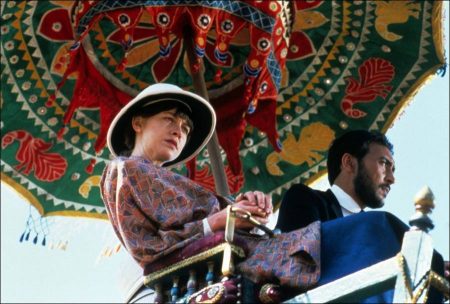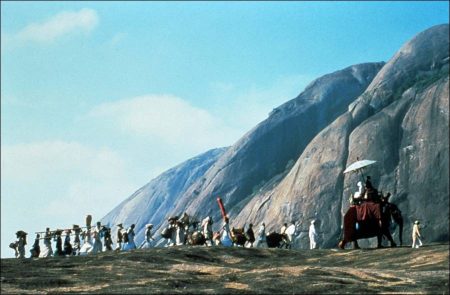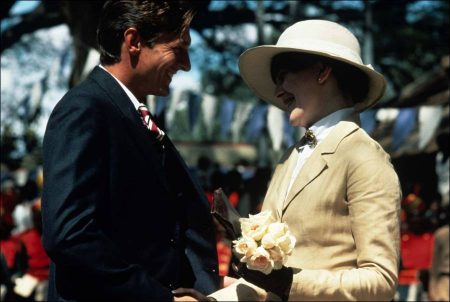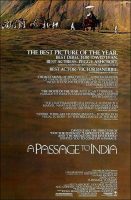A Passage to India is set in the 1920s during the period of growing influence of the Indian independence movement in the British Raj. Mrs. Moore (Peggy Ashcroft) and Adela Quested (Judy Davis) sail from England to India, where Ronny Heaslop (Nigel Havers), the older woman’s son and younger woman’s fiancé, is the local magistrate in the provincial town of Chandrapore.
Through school superintendent Richard Fielding (James Fox), the two visitors meet eccentric elderly Brahmin scholar Professor Godbole (Alec Guinness), and they befriend Dr. Aziz Ahmed (Victor Banerjee), an impoverished widower who initially meets Mrs. Moore in a moonlit mosque overlooking the Ganges River. Their sensitivity and unprejudiced attitude toward native Indians endears them to him. When Mrs. Moore and Adela express an interest in seeing the “real” India, as opposed to the Anglicised environment of cricket, polo, and afternoon tea the British expatriates have created for themselves, Aziz offers to host an excursion to the remote Marabar Caves.
The outing goes reasonably well until the two women begin exploring the caves with Aziz and his sizable entourage. Mrs. Moore experiences an overwhelming sense of claustrophobia that forces her to return to the open air. She encourages Adela and Aziz to continue their exploration but suggests they bring only one guide. The three set off for a series of caves far removed from the rest of the group, and before entering Aziz steps aside to smoke a cigarette. He returns to find Adela has disappeared; shortly after he sees her running headlong down the hill, bloody and dishevelled. Upon their return to town, Aziz is jailed to await trial for attempted rape, and an uproar ensues between the Indians and the Colonials.
The case becomes a cause celebre among the British. When Mrs. Moore makes it clear she firmly believes in Aziz’s innocence and will not testify against him, it is decided she should return to England. She subsequently suffers a fatal heart attack during the voyage and is buried at sea. To the consternation of her fiancé and friends, Adela has a change of heart and clears Aziz in open court. The Colonials are forced to make an ignominious retreat while the Indians carry the exonerated man out of the courtroom on their shoulders, cheering wildly.
In the aftermath, Miss Quested breaks off her engagement and leaves India, while Dr. Aziz abandons his Western attire, dons traditional dress, and withdraws completely from Anglo-Indian society, opening a clinic in Northern India near the Himalayas. Although he remains angry and bitter for years, he eventually writes to Adela to convey his thanks and forgiveness.
A Passage to India is a 1984 epic historical drama film written, directed and edited by David Lean. The screenplay is based on the 1960 play of the same name by Santha Rama Rau, which was in turn based on the 1924 novel of the same name by E.M. Forster.
Set in the 1920s during the period of the British Raj, the film tells the story of the interactions of several characters in the fictional city of Chandrapore, namely Dr. Aziz, Mrs Moore, Adela Quested, and Cyril Fielding. When newcomer to India Adela accuses Aziz of an attempted rape within the famed Marabar Caves, the city is split between the British elite and the native underclass as the budding friendship between Aziz and Fielding is tested. The film explores themes of racism, imperialism, religion, and the nature of relationships both friendly and marital.
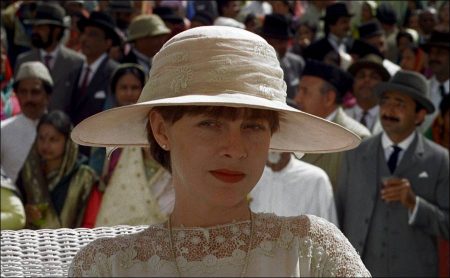
This was the final film of Lean’s prestigious career, and the first feature-film he had directed in fourteen years, since Ryan’s Daughter in 1970. Receiving universal critical acclaim upon its release with many praising it as Lean’s finest since Lawrence of Arabia, A Passage to India received eleven nominations at the 57th Academy Awards, including Best Picture, Best Director for Lean, and Best Actress for Judy Davis for her portrayal as Adela Quested. Peggy Ashcroft won the Academy Award for Best Supporting Actress for her portrayal as Mrs Moore, making her, at 77, the oldest actress to win the award, and Maurice Jarre won his third Academy Award for Best Original Score.
Filming took place from November 1983 to June 1984. The Marabar Caves are based on the Barabar Caves, some 35 km north of Gaya, in Bihar. Lean visited the caves during pre-production, and found them flat and unattractive; concerns about bandits were also prevalent. Instead he used the hills of Savandurga and Ramadevarabetta some tens of kilometers from Bangalore, where much of the principal filming took place; small cave entrances were carved out by the production company. Other scenes were filmed in Ramanagaram (Karnataka) and Udhagamandalam (Tamil Nadu) and in Srinagar (Jammu and Kashmir). Some interiors were shot at Shepperton Studios in Surrey and in Bangalore Palace.
The film’s score was composed by longtime Lean collaborator Maurice Jarre. According to Jarre, the director told him, “Maurice, I want you to write music right from your groin for this very long scene in the cave. This isn’t a story of India, it’s a story of a woman. I want you to write music that evokes awakening sexuality.” Jarre wrote 45 minutes of music in two and a half weeks. He said, “David talks to me in images. A film artist never asks for an oboe to cover up a bad scene; a film artist doesn’t think of music as medicine for a sick movie. David talks to me as he would talk to an actor.”
A Passage to India (1984)
Directed by: David Lean
Starring: Peggy Ashcroft, Judy Davis, James Fox, Alec Guinness, Nigel Havers, Victor Banerjee, Roshan Seth, Richard Wilson, Antonia Pemberton, Michael Culver, Art Malik, Ann Firbank
Screenplay by: David Lean
Production Design by: John Box, Herbert Westbrook
Cinematography by: Ernest Day
Film Editing by: David Lean
Costume Design by: Judy Moorcroft
Set Decoration by: Hugh Scaife
Art Direction by: Cliff Robinson, Leslie Tomkins, Herbert Westbrook, Ram Yedekar
Music by: Maurice Jarre
MPAA Rating: None.
Distributed by: Thorn EMI Screen Entertainment (UK), Columbia Pictures (North America)
Release Date: December 14, 1984
Views: 408
